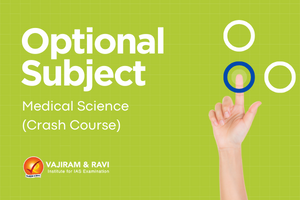
Address:
1-B/7,Pusa Road,
Old Rajinder Nagar,
New Delhi - 110060
Landmark:
Adjacent to Gate 5, Karol Bagh Metro Station & Pillar no.103
City:Delhi
Vendor Type:Service Provider
If you’re looking for a Medical Science Crash Course for UPSC, several renowned institutes offer fast-paced programs aimed at quickly covering the crucial topics. Here’s a summary of what these crash courses usually include:
1. Top Institutes Offering Medical Science Crash Courses
- Ravi Bhardwaj’s Medical Science Classes: Offers a quick-paced crash course focusing on essential topics like Human Anatomy, Physiology, and Biochemistry. The course features condensed lectures, summary notes, and practice tests.
- Insight IAS: Provides a thorough crash course in Medical Science with condensed materials covering key areas such as Pathology, Microbiology, and Pharmacology. The program includes rapid revision sessions and mock tests.
- Vision IAS: Delivers a targeted Medical Science crash course with emphasis on high-priority topics and exam strategies. The course includes brief lectures, essential notes, and practice questions.
- Unacademy: Features an intensive Medical Science crash course led by experienced instructors. This course includes key topic coverage, quick revision sessions, and interactive doubt-clearing opportunities.
2. Course Features
- Focused Lectures: Short, intensive lectures that cover essential topics efficiently.
- Condensed Study Materials: Summarized notes and resources that highlight critical concepts and exam-relevant information.
- Mock Tests and Practice Questions: Regular tests and questions designed to help you assess your knowledge and improve exam performance.
- Quick Revision Sessions: Concentrated review sessions to reinforce important topics effectively.
- Doubt Clearing Sessions: Specific time allocated to resolve questions and clarify complex topics.
3. Recommended Study Resources for Medical Science
- Books for Anatomy:
- “Gray’s Anatomy” by Henry Gray
- “Anatomy: A Regional Atlas of the Human Body” by Carmine D. Clemente
- Books for Physiology:
- “Guyton and Hall Textbook of Medical Physiology” by John E. Hall
- “Medical Physiology” by Walter F. Boron and Emile L. Boulpaep
- Books for Biochemistry:
- “Harper’s Illustrated Biochemistry” by Robert K. Murray, et al.
- “Lehninger Principles of Biochemistry” by David L. Nelson and Michael M. Cox
- Books for Pathology:
- “Robbins Basic Pathology” by Kumar, Abbas, and Aster
- “Pathology: The Big Picture” by K. L. Reddy
- Books for Pharmacology:
- “Basic and Clinical Pharmacology” by Bertram Katzung
- “Goodman & Gilman’s: The Pharmacological Basis of Therapeutics” by Laurence Brunton, et al.
4. Flexibility and Accessibility
- Intensive Duration: Designed for intensive study over a short period to quickly cover the syllabus.
- Online Accessibility: Many courses are available online, allowing you to attend from any location.
5. Self-study vs Crash Course
While self-study with textbooks and past papers is an option, a crash course offers structured, focused instruction and resources tailored to maximize your preparation in a short time.
